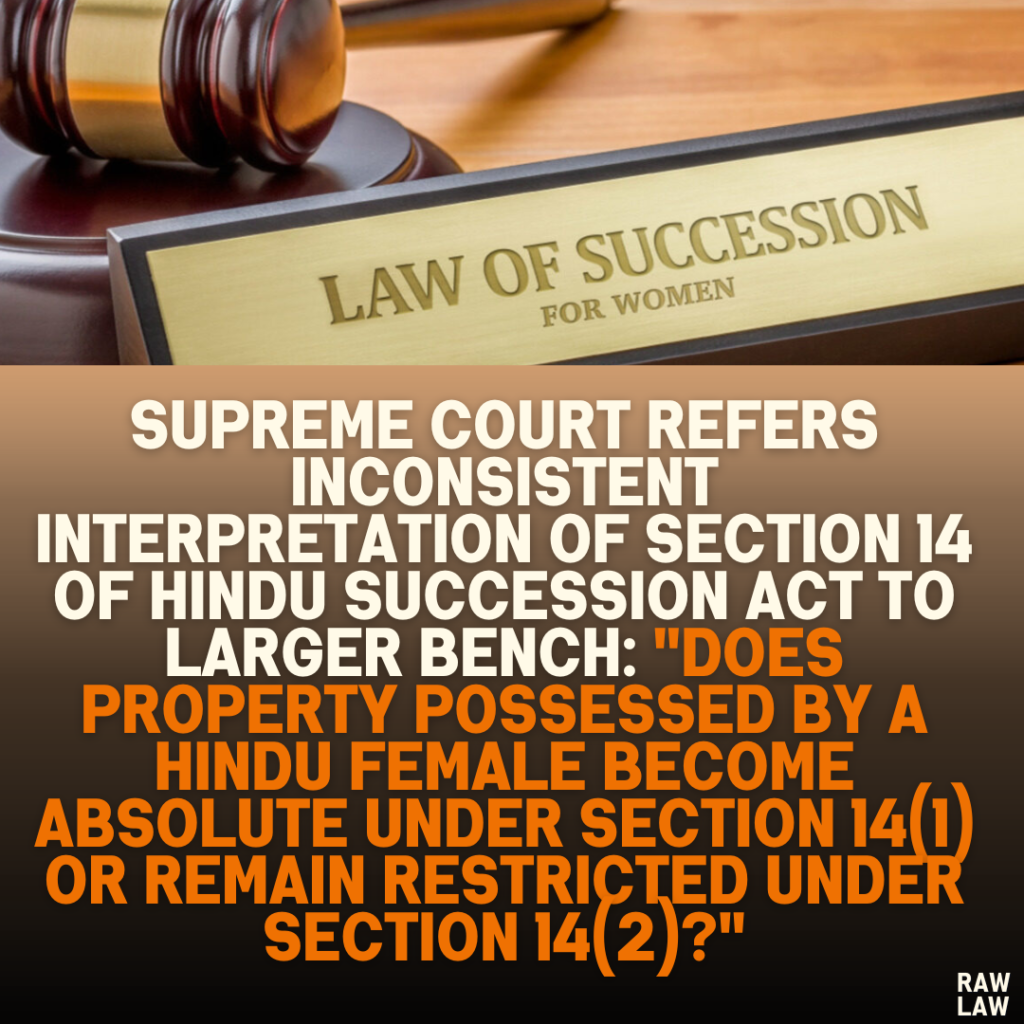Court’s Decision
The Supreme Court directed the matter regarding the interpretation of Section 14 of the Hindu Succession Act, 1956, to be referred to a larger bench. This decision was made due to conflicting judgments by various benches of the court on the scope and application of subsections (1) and (2) of Section 14, which governs the proprietary rights of Hindu females. The court observed the necessity for clarity and consistency in the law, as these provisions significantly impact property rights across the country.
Facts
- The case arose from a dispute over a property originally owned by Kanwar Bhan, who executed a will in 1965 granting a life estate to his wife, Lachhmi Bai. The will explicitly prohibited her from selling or mortgaging the property.
- Kanwar Bhan passed away in 1965, and in 1981, Lachhmi Bai sold the property through a registered sale deed.
- The heirs of Kanwar Bhan, including his son and grandsons, filed a suit claiming the sale was void since it violated the terms of the will. They sought possession of the property.
- The trial court and the first appellate court ruled in favor of the widow, relying on the landmark judgment in V. Tulasamma v. Sesha Reddy (1977), which held that property acquired by a Hindu female in lieu of maintenance becomes her absolute property under Section 14(1).
- However, the High Court reversed these findings, relying on Sadhu Singh v. Gurdwara Sahib Narike, which interpreted Section 14(2) as limiting the widow’s rights to those explicitly stated in the will.
Issues
- Does the sale of property by a Hindu widow, granted under a restrictive will, fall under Section 14(1) or Section 14(2) of the Hindu Succession Act?
- How should the court reconcile the conflicting interpretations of Section 14 in previous judgments?
Petitioner’s Arguments
- The appellant argued that the principles in V. Tulasamma should apply, under which the life estate granted to the widow in lieu of maintenance should be converted into full ownership under Section 14(1).
- The High Court’s reliance on Sadhu Singh was contended to be incorrect as the principles therein conflicted with the established interpretation in Tulasamma.
- The appellant cited various precedents, including Thota Sesharathamma v. Thota Manikyamma and Balwant Kaur v. Chanan Singh, to reinforce their argument for a liberal interpretation of Section 14(1).
Respondent’s Arguments
- The respondents maintained that Section 14(2) applied, as the property was expressly granted under a will that restricted the widow’s rights.
- They emphasized that the decision in Karmi v. Amru, which upheld restrictions under Section 14(2), had not been overruled and continued to bind subsequent benches.
- The respondents also relied on cases like Bhura v. Kashiram and Sadhu Singh v. Gurdwara Sahib Narike to argue that Section 14(1) does not override restrictions explicitly imposed by a testamentary disposition.
Analysis of the Law
- Section 14(1): Converts property possessed by a Hindu female, regardless of when acquired, into her absolute property, provided she had a pre-existing right, such as maintenance.
- Section 14(2): Acts as an exception, restricting property rights when acquired under a will, gift, or instrument that explicitly limits her ownership.
- Conflicting interpretations:
- V. Tulasamma: Held that property granted to a Hindu female in lieu of maintenance is her absolute property under Section 14(1).
- Karmi: Established that property acquired under a restrictive will falls under Section 14(2), and the widow’s rights are limited to the terms of the instrument.
- Sadhu Singh: Reinforced the idea that property granted under a testamentary disposition with restrictions is governed by Section 14(2), not Section 14(1).
- The court noted that the interpretation of Section 14 is inconsistent across various judgments, leading to uncertainty and confusion.
Precedent Analysis
- Cases favoring a liberal interpretation (Section 14(1)):
- V. Tulasamma v. Sesha Reddy (1977): Landmark decision promoting the socio-economic rights of Hindu females.
- Thota Sesharathamma v. Thota Manikyamma: Emphasized the enlargement of a limited estate into absolute ownership under Section 14(1).
- Cases favoring restrictive interpretation (Section 14(2)):
- Karmi v. Amru: Upheld restrictions imposed under wills.
- Sadhu Singh v. Gurdwara Sahib Narike: Stressed the binding nature of terms in testamentary dispositions under Section 14(2).
Court’s Reasoning
- The court acknowledged the divergent streams of thought on Section 14:
- One view adheres to Tulasamma as an inviolable principle.
- Another considers restrictions imposed through testamentary dispositions under Section 14(2) as binding.
- It emphasized the necessity of reconciling these views to ensure uniformity in interpreting Section 14.
- Given the widespread implications of the issue, the court deemed it appropriate to refer the matter to a larger bench for a comprehensive restatement of the law.
Conclusion
The court directed the Registry to place the matter before the Chief Justice of India for constituting an appropriate larger bench to resolve the inconsistencies and clarify the interpretation of Section 14 of the Hindu Succession Act.
Implications
- Legal clarity: A larger bench decision will bring uniformity in interpreting Section 14, reducing litigation and uncertainty.
- Impact on Hindu females: The judgment will have far-reaching consequences for the property rights of Hindu females, particularly widows and dependents.
- Judicial efficiency: Resolving this issue will streamline the adjudication of similar disputes in lower courts.
